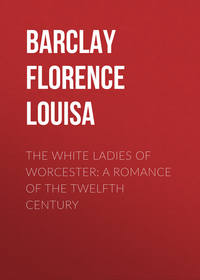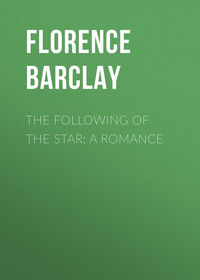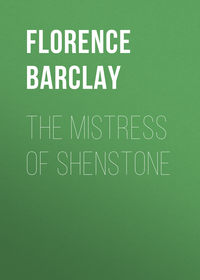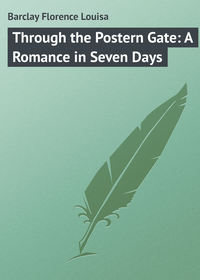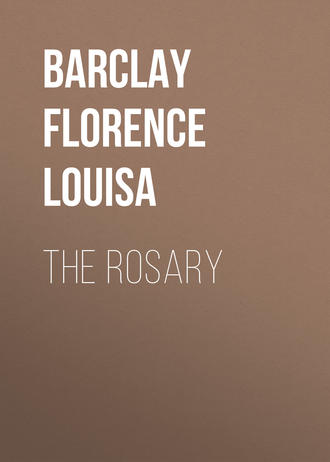 полная версия
полная версияThe Rosary
"Then come home, my dear girl, ring me up and ask for an appointment; or chance it, and let Stoddart slip you into my consulting-room between patients, and report how the prescription has worked. I never gave a better; and you need not offer me a guinea! I attend old friends gratis."
Jane laughed, and gripped his hand. "Oh, boy," she said, "I believe you are right. My whole ideas of life have been focussed on myself and my own individual pains and losses. I will do as you say; and God bless you for saying it.—Here comes Flower. Flower," she said, as the doctor's wife trailed in, wearing a soft tea-gown, and turning on the electric lights as she passed, "will this boy of ours ever grow old? Here he is, seriously advising that a stout, middle-aged woman should climb the Great Pyramid as a cure for depression, and do it in record time!"
"Darling," said the doctor's wife, seating herself on the arm of his chair, "whom have you been seeing who is stout, or depressed, or middle-aged? If you mean Mrs. Parker Bangs, she is not middle-aged, because she is an American, and no American is ever middle-aged. And she is only depressed because, even after painting her lovely niece's portrait, Garth Dalmain has failed to propose to her. And it is no good advising her to climb the Great Pyramid, though she is doing Egypt this winter, because I heard her say yesterday that she should never think of going up the pyramids until the children of Israel, or whoever the natives are who live around those parts, have the sense to put an elevator right up the centre."
Jane and the doctor laughed, and Flower, settling herself more comfortably, for the doctor's arm had stolen around her, said: "Jane, I heard you playing THE ROSARY just now, such a favourite of mine, and it is months since I heard it. Do sing it, dear."
Jane met the doctor's eyes and smiled reassuringly; then turned without any hesitation and did as Flower asked. The prescription had already done her good.
At the last words of the song the doctor's wife bent over and laid a tender little kiss just above his temple, where the thick dark hair was streaked with silver. But the doctor's mind was intent on Jane, and before the final chords were struck he knew he had diagnosed her case correctly. "But she had better go abroad," he thought. "It will take her mind off herself altogether, giving her a larger view of things in general, and a better proportioned view of things in particular. And the boy won't change; or, if he does, Jane will be proved right, to her own satisfaction. But, if this is HER side, good heavens, what must HIS be! I had wondered what was sapping all his buoyant youthfulness. To care for Jane would be an education; but to have made Jane care! And then to have lost her! He must have nerves of steel, to be facing life at all. What is this cross they are both learning to kiss, and holding up between them? Perhaps Niagara will sweep it away, and she will cable him from there."
Then the doctor took the dear little hand resting on his shoulder and kissed it softly, while Jane's back was still turned. For the doctor had had past experience of the cross, and now the pearls were very precious.
So Jane took the prescription, and two years went by in the taking; and here she was, on the top of the Great Pyramid, and, moreover, she had done it in record time, and laughed as she thought of how she should report the fact to Deryck.
Her Arabs lay around, very hot and shiny, and content. Large backsheesh was assured, and they looked up at her with pleased possessive eyes, as an achievement of their own; hardly realising how large a part her finely developed athletic powers and elastic limbs had played in the speed of the ascent.
And Jane stood there, sound in wind and limb, and with the exhilarating sense, always helpful to the mind, of a bodily feat accomplished.
She was looking her best in her Norfolk coat and skirt of brown tweed with hints of green and orange in it, plenty of useful pockets piped with leather, leather buttons, and a broad band of leather round the bottom of the skirt. A connoisseur would have named at once the one and only firm from which that costume could have come, and the hatter who supplied the soft green Tyrolian hat—for Jane scorned pith helmets—which matched it so admirably. But Schehati was no connoisseur of clothing, though a pretty shrewd judge of ways and manners, and he summed up Jane thus: "Nice gentleman-lady! Give good backsheesh, and not sit down halfway and say: `No top'! But real lady-gentleman! Give backsheesh with kind face, and not send poor Arab to Assouan."
Jane was deeply tanned by the Eastern sun. Burning a splendid brown, and enjoying the process, she had no need of veils or parasols; and her strong eyes faced the golden light of the desert without the aid of smoked glasses. She had once heard Garth remark that a sight which made him feel really ill, was the back view of a woman in a motor-veil, and Jane had laughingly agreed, for to her veils of any kind had always seemed superfluous. The heavy coils of her brown hair never blew about into fascinating little curls and wisps, but remained where, with a few well-directed hairpins, she each morning solidly placed them.
Jane had never looked better than she did on this March day, standing on the summit of the Great Pyramid. Strong, brown, and well-knit, a reliable mind in a capable body, the undeniable plainness of her face redeemed by its kindly expression of interest and enjoyment; her wide, pleasant smile revealing her fine white teeth, witnesses to her perfect soundness and health, within and without.
"Nice gentleman-lady," murmured Schehati again: and had Jane overheard the remark it would not have offended her; for, though she held a masculine woman only one degree less in abhorrence than an effeminate man, she would have taken Schehati's compound noun as a tribute to the fact that she was well-groomed and independent, knowing her own mind, and, when she started out to go to a place, reaching it in the shortest possible time, without fidget, fuss, or flurry. These three feminine attributes were held in scorn by Jane, who knew herself so deeply womanly that she could afford in minor ways to be frankly unfeminine.
The doctor's prescription had worked admirably. That look of falling to pieces and ageing prematurely—a general dilapidation of mind and body—which it had grieved and startled him to see in Jane as she sat before him on the music-stool, was gone completely. She looked a calm, pleasant thirty; ready to go happily on, year by year, towards an equally agreeable and delightful forty; and not afraid of fifty, when that time should come. Her clear eyes looked frankly out upon the world, and her sane mind formed sound opinions and pronounced fair judgments, tempered by the kindliness of an unusually large and generous heart.
Just now she was considering the view and finding it very good. Its strong contrasts held her.
On one side lay the fertile Delta, with its groves of waving palm, orange, and olive trees, growing in rich profusion on the banks of the Nile, a broad band of gleaming silver. On the other, the Desert, with its far-distant horizon, stretching away in undulations of golden sand; not a tree, not a leaf, not a blade of grass, but boundless liberty, an ocean of solid golden glory. For the sun was setting, and the sky flamed into colour.
"A parting of the ways," said Jane; "a place of choice. How difficult to know which to choose—liberty or fruitfulness. One would have to consult the Sphinx—wise old guardian of the ages, silent keeper of Time's secrets, gazing on into the future as It has always gazed, while future became present, and present glided into past.—Come, Schehati, let us descend. Oh, yes, I will certainly sit upon the stone on which the King sat when he was Prince of Wales. Thank you for mentioning it. It will supply a delightful topic of conversation next time I am honoured by a few minutes of his gracious Majesty's attention, and will save me from floundering into trite remarks about the weather.—And now take me to the Sphinx, Schehati. There is a question I would ask of It, just as the sun dips below the horizon."
CHAPTER XIII
THE ANSWER OF THE SPHINX
Moonlight in the desert.
Jane ordered her after-dinner coffee on the piazza of the hotel, that she might lose as little as possible of the mystic loveliness of the night. The pyramids appeared so huge and solid, in the clear white light; and the Sphinx gathered unto itself more mystery.
Jane promised herself a stroll round by moonlight presently. Meanwhile she lay back in a low wicker chair, comfortably upholstered, sipping her coffee, and giving herself up to the sense of dreamy content which, in a healthy body, is apt to follow vigorous exertion.
Very tender and quiet thoughts of Garth came to her this evening, perhaps brought about by the associations of moonlight.
"The moon shines bright:—in such a night as this,When the sweet wind did gently kiss the trees,And they did make no noise—"Ah! the great poet knew the effect upon the heart of a vivid reminder to the senses. Jane now passed beneath the spell.
To begin with, Garth's voice seemed singing everywhere:
"Enable with perpetual lightThe dulness of our blinded sight."Then from out the deep blue and silvery light, Garth's dear adoring eyes seemed watching her. Jane closed her own, to see them better. To-night she did not feel like shrinking from them, they were so full of love.
No shade of critical regard was in them. Ah! had she wronged him with her fears for the future? Her heart seemed full of trust to-night, full of confidence in him and in herself. It seemed to her that if he were here she could go out with him into this brilliant moonlight, seat herself upon some ancient fallen stone, and let him kneel in front of her and gaze and gaze in his persistent way, as much as he pleased. In thought there seemed to-night no shrinking from those dear eyes. She felt she would say: "It is all your own, Garth, to look at when you will. For your sake, I could wish it beautiful; but if it is as you like it, my own Dear, why should I hide it from you?"
What had brought about this change of mind? Had Deryck's prescription done its full work? Was this a saner point of view than the one she had felt constrained to take when she arrived, through so much agony of renunciation, at her decision? Instead of going up the Nile, and then to Constantinople and Athens, should she take the steamer which sailed from Alexandria to-morrow, be in London a week hence, send for Garth, make full confession, and let him decide as to their future?
That he loved her still, it never occurred to Jane to doubt. At the very thought of sending for him and telling him the simple truth, he seemed so near her once more, that she could feel the clasp of his arms, and his head upon her heart. And those dear shining eyes! Oh, Garth, Garth!
"One thing is clear to me to-night," thought Jane. "If he still needs me—wants me—I cannot live any longer away from him. I must go to him." She opened her eyes and looked towards the Sphinx. The whole line of reasoning which had carried such weight at Shenstone flashed through her mind in twenty seconds. Then she closed her eyes again and clasped her hands upon her bosom.
"I will risk it," she said; and deep joy awoke within her heart.
A party of English people came from the dining-room on to the piazza with a clatter. They had arrived that evening and gone in late to dinner. Jane had hardly noticed them,—a handsome woman and her daughter, two young men, and an older man of military appearance. They did not interest Jane, but they broke in upon her reverie; for they seated themselves at a table near by and, in truly British fashion, continued a loud-voiced conversation, as if no one else were present. One or two foreigners, who had been peacefully dreaming over coffee and cigarettes, rose and strolled away to quiet seats under the palm trees. Jane would have done the same, but she really felt too comfortable to move, and afraid of losing the sweet sense of Garth's nearness. So she remained where she was.
The elderly man held in his hand a letter and a copy of the MORNING POST, just received from England. They were discussing news contained in the letter and a paragraph he had been reading aloud from the paper.
"Poor fellow! How too sad!" said the chaperon of the party.
"I should think he would sooner have been killed outright!" exclaimed the girl. "I know I would."
"Oh, no," said one of the young men, leaning towards her. "Life is sweet, under any circumstances."
"Oh, but blind!" cried the young voice, with a shudder. "Quite blind for the rest of one's life. Horrible!"
"Was it his own gun?" asked the older woman. "And how came they to be having a shooting party in March?"
Jane smiled a fierce smile into the moonlight. Passionate love of animal life, intense regard for all life, even of the tiniest insect, was as much a religion with her as the worship of beauty was with Garth. She never could pretend sorrow over these accounts of shooting accidents, or falls in the hunting-field. When those who went out to inflict cruel pain were hurt themselves; when those who went forth to take eager, palpitating life, lost their own; it seemed to Jane a just retribution. She felt no regret, and pretended none. So now she smiled fiercely to herself, thinking: "One pair of eyes the less to look along a gun and frustrate the despairing dash for home and little ones of a terrified little mother rabbit. One hand that will never again change a soaring upward flight of spreading wings, into an agonised mass of falling feathers. One chance to the good, for the noble stag, as he makes a brave run to join his hinds in the valley."
Meanwhile the military-looking man had readjusted his eye-glasses and was holding the sheets of a closely written letter to the light.
"No," he said after a moment, "shooting parties are over. There is nothing doing on the moors now. They were potting bunnies."
"Was he shooting?" asked the girl.
"No," replied the owner of the letter, "and that seems such hard luck. He had given up shooting altogether a year or two ago. He never really enjoyed it, because he so loved the beauty of life and hated death in every form. He has a lovely place in the North, and was up there painting. He happened to pass within sight of some fellows rabbit-shooting, and saw what he considered cruelty to a wounded rabbit. He vaulted over a gate to expostulate and to save the little creature from further suffering. Then it happened. One of the lads, apparently startled, let off his gun. The charge struck a tree a few yards off, and the shot glanced. It did not strike him full. The face is only slightly peppered and the brain quite uninjured. But shots pierced the retina of each eye, and the sight is hopelessly gone."
"Awful hard luck," said the young man.
"I never can understand a chap not bein' keen on shootin'," said the youth who had not yet spoken.
"Ah, but you would if you had known him," said the soldier. "He was so full of life and vivid vitality. One could not imagine him either dying or dealing death. And his love of the beautiful was almost a form of religious worship. I can't explain it; but he had a way of making you see beauty in things you had hardly noticed before. And now, poor chap, he can't see them himself."
"Has he a mother?" asked the older woman.
"No, he has no one. He is absolutely alone. Scores of friends of course; he was a most popular man about town, and could stay in almost any house in the kingdom if he chose to send a post-card to say he was coming. But no relations, I believe, and never would marry. Poor chap! He will wish he had been less fastidious, now. He might have had the pick of all the nicest girls, most seasons. But not he! Just charming friendships, and wedded to his art. And now, as Lady Ingleby, says, he lies in the dark, helpless and alone."
"Oh, do talk of something else!" cried the girl, pushing back her chair and rising. "I want to forget it. It's too horribly sad. Fancy what it must be to wake up and not know whether it is day or night, and to have to lie in the dark and wonder. Oh, do come out and talk of something cheerful."
They all rose, and the young man slipped his hand through the girl's arm, glad of the excuse her agitation provided.
"Forget it, dear," he said softly. "Come on out and see the old Sphinx by moonlight."
They left the piazza, followed by the rest of the party; but the man to whom the MORNING POST belonged laid it on the table and stayed behind, lighting a cigar.
Jane rose from her chair and came towards him.
"May I look at your paper?" she said abruptly.
"Certainly," he replied, with ready courtesy. Then, looking more closely at her: "Why, certainly, Miss Champion. And how do you do? I did not know you were in these parts."
"Ah, General Loraine! Your face seemed familiar, but I had not recognised you, either. Thanks, I will borrow this if I may. And don't let me keep you from your friends. We shall meet again by and by."
Jane waited until the whole party had passed out of sight and until the sound of their voices and laughter had died away in the distance. Then she returned to her chair, the place where Garth had seemed so near. She looked once more at the Sphinx and at the huge pyramid in the moonlight.
Then she took up the paper and opened it.
"Enable with perpetual lightThe dulness of our blinded sight."Yes—it was Garth Dalmain—HER Garth, of the adoring shining eyes—who lay at his house in the North; blind, helpless, and alone.
CHAPTER XIV
IN DERYCK'S SAFE CONTROL
The white cliffs of Dover gradually became more solid and distinct, until at length they rose from the sea, a strong white wall, emblem of the undeniable purity of England, the stainless honour and integrity of her throne, her church, her parliament, her courts of justice, and her dealings at home and abroad, whether with friend or foe. "Strength and whiteness," thought Jane as she paced the steamer's deck; and after a two years' absence her heart went out to her native land. Then Dover Castle caught her eye, so beautiful in the pearly light of that spring afternoon. Her mind leaped to enjoyment, then fell back stunned by the blow of quick remembrance, and Jane shut her eyes.
All beautiful sights brought this pang to her heart since the reading of that paragraph on the piazza of the Mena House Hotel.
An hour after she had read it, she was driving down the long straight road to Cairo; embarked at Alexandria the next day; landed at Brindisi, and this night and day travelling had brought her at last within sight of the shores of England. In a few minutes she would set foot upon them, and then there would be but two more stages to her journey. For, from the moment she started, Jane never doubted her ultimate destination,—the room where pain and darkness and despair must be waging so terrible a conflict against the moral courage, the mental sanity, and the instinctive hold on life of the man she loved.
That she was going to him, Jane knew; but she felt utterly unable to arrange how or in what way her going could be managed. That it was a complicated problem, her common sense told her; though her yearning arms and aching bosom cried out: "O God, is it not simple? Blind and alone! MY Garth!"
But she knew an unbiased judgment, steadier than her own, must solve the problem; and that her surest way to Garth lay through the doctor's consulting-room. So she telegraphed to Deryck from Paris, and at present her mind saw no further than Wimpole Street.
At Dover she bought a paper, and hastily scanned its pages as she walked along the platform in the wake of the capable porter who had taken possession of her rugs and hand baggage. In the personal column she found the very paragraph she sought.
"We regret to announce that Mr. Garth Dalmain still lies in a most precarious condition at his house on Deeside, Aberdeenshire, as a result of the shooting accident a fortnight ago. His sight is hopelessly gone, but the injured parts were progressing favourably, and all fear of brain complications seemed over. During the last few days, however, a serious reaction from shock has set in, and it has been considered necessary to summon Sir Deryck Brand, the well-known nerve specialist, in consultation with the oculist and the local practitioner in charge of the case. There is a feeling of wide-spread regret and sympathy in those social and artistic circles where Mr. Dalmain was so well-known and so deservedly popular."
"Oh, thank you, m'lady," said the efficient porter when he had ascertained, by a rapid glance into his palm, that Jane's half-crown was not a penny. He had a sick young wife at home, who had been ordered extra nourishment, and just as the rush on board began, he had put up a simple prayer to the Heavenly Father "who knoweth that ye have need of these things," asking that he might catch the eye of a generous traveller. He felt he had indeed been "led" to this plain, brown-faced, broad-shouldered lady, when he remembered how nearly, after her curt nod from a distance had engaged him, he had responded to the blandishments of a fussy little woman, with many more bags and rugs, and a parrot cage, who was now doling French coppers out of the window of the next compartment. "Seven pence 'apenny of this stuff ain't much for carrying all that along, I DON'T think!" grumbled his mate; and Jane's young porter experienced the double joy of faith confirmed, and willing service generously rewarded.
A telegraph boy walked along the train, saying: "Honrubble Jain Champyun" at intervals. Jane heard her name, and her arm shot out of the window.
"Here, my boy! It is for me."
She tore it open. It was from the doctor.
"Welcome home. Just back from Scotland. Will meet you Charing Cross, and give you all the time you want. Have coffee at Dover. DERYCK."
Jane gave one hard, tearless sob of thankfulness and relief. She had been so lonely.
Then she turned to the window. "Here, somebody! Fetch me a cup of coffee, will you?"
Coffee was the last thing she wanted; but it never occurred to any one to disobey the doctor, even at a distance.
The young porter, who still stood sentry at the door of Jane's compartment, dashed off to the refreshment room; and, just as the train began to move, handed a cup of steaming coffee and a plate of bread-and-butter in at the window.
"Oh, thank you, my good fellow," said Jane, putting the plate on the seat, while she dived into her pocket. "Here! you have done very well for me. No, never mind the change. Coffee at a moment's notice should fetch a fancy price. Good-bye."
The train moved on, and the porter stood looking after it with tears in his eyes. Over the first half-crown he had said to himself: "Milk and new-laid eggs." Now, as he pocketed the second, he added the other two things mentioned by the parish doctor: "Soup and jelly"; and his heart glowed. "Your heavenly Father knoweth that ye have need of these things."
And Jane, seated in a comfortable corner, choked back the tears of relief which threatened to fall, drank her coffee, and was thereby more revived than she could have thought possible. She, also, had need of many things. Not of half-crowns; of those she had plenty. But above all else she needed just now a wise, strong, helpful friend, and Deryck had not failed her.
She read his telegram through once more, and smiled. How like him to think of the coffee; and oh, how like him to be coming to the station.
She took off her hat and leaned back against the cushions. She had been travelling night and day, in one feverish whirl of haste, and at last she had brought herself within reach of Deryck's hand and Deryck's safe control. The turmoil of her soul was stilled; a great calm took its place, and Jane dropped quietly off to sleep. "Your heavenly Father knoweth that ye have need of these things."
Washed and brushed and greatly refreshed, Jane stood at the window of her compartment as the train steamed into Charing Cross.
The doctor was stationed exactly opposite the door when her carriage came to a standstill; mere chance, and yet, to Jane, it seemed so like him to have taken up his position precisely at the right spot on that long platform. An enthusiastic lady patient had once said of Deryck Brand, with more accuracy of definition than of grammar: "You know, he is always so very JUST THERE." And this characteristic of the doctor had made him to many a very present help in time of trouble.


